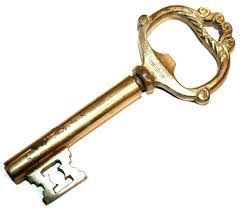key
英 [kiː]
美 [kiː]
- n. (打字机等的)键;关键;钥匙
- vt. 键入;锁上;调节…的音调;提供线索
- vi. 使用钥匙
- adj. 关键的
- n. (Key)人名;(英)基;(德、荷、瑞典)凯
使用频率:

记忆方法
将“key”与“钥匙”的形状联想,想象钥匙那独特的扁平且带有凹槽的一端可以打开“钥匙”(key)这个单词的秘密,即“钥匙”就是解决某个问题的答案或者打开某种情况的“key”。
以上内容由AI生成, 仅供参考和借鉴
中文词源
key 钥匙,琴键,关键
来自古英语caeg,钥匙,可能来自Proto-Germanic*ki,劈开,分开,来自PIE*ke,使锋利,磨,词源同cone,hone.后用于指钥匙,引申词义琴键,键盘,比喻义关键,核心。
英语词源
- key
-
key: [OE] The Old English ancestor of key was cǣg. This produced a modern English word which to begin with was pronounced to rhyme with bay, and its present-day pronunciation, rhyming with bee, did not come to the fore until the 18th century. No one knows where the word originally came from; it has no living relatives in other Germanic languages.
- key (n.1)
- "metal piece that works a lock," from Old English cæg "key," of unknown origin, with no certain cognates other than Old Frisian kei. Perhaps related to Middle Low German keie "lance, spear" on notion of "tool to cleave with," from Proto-Germanic *ki- "to cleaver, split" (cognates: German Keil "wedge," Gothic us-kijans "come forth," said of seed sprouts, keinan "to germinate"). But Liberman writes, "The original meaning of *kaig-jo- was presumably '*pin with a twisted end.' Words with the root *kai- followed by a consonant meaning 'crooked, bent; twisted' are common only in the North Germanic languages." Modern pronunciation is a northern variant predominating from c. 1700; earlier it was often spelled and pronounced kay.
Figurative sense of "that which serves to open or explain" was in Old English; meaning "that which holds together other parts" is from 1520s. As "answer to a test," it is from chess, short for key move, "first move in a solution to a set problem." Musical sense of "tone, note" is 15c., but modern sense of "scale" is 1580s, probably as a translation of Latin clavis or French clef (see clef; also see keynote). Extended c. 1500 to "mechanism on a musical instrument." As a verb meaning "to scratch (a car's paint job) with a key" it is recorded by 1986. - key (n.2)
- "low island," 1690s, from Spanish cayo "shoal, reef," from Taino cayo "small island;" spelling influenced by Middle English key "wharf" (c. 1300), from Old French kai "sand bank" (see quay).
权威例句
- 1. The key issue was whether the four defendants acted dishonestly.
- 关键问题是4名被告是否存在欺诈行为。
- 2. For a beach resort with a difference, try Key West.
- 如果想去一个与众不同的海滨度假胜地,那就去基韦斯特吧。
- 3. He unlocked her door and handed her back the key.
- 他给她打开门锁,并把钥匙交还给她。
- 4. The key to his success is his logical mind.
- 他成功的关键在于他擅长逻辑思维。
- 5. At these conventions, executives fraternized with the key personnel of other banks.
- 在这些集会上,主管们和其他银行的重要人员友善往来。
